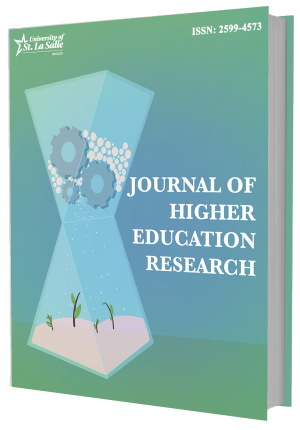Factors of Risk Cognition Among Nursing Students' Clinical Performance
https://doi.org/10.70228/YJHER2024010
Cite this article Read this article
ABSTRACT
This descriptive correlation analysis aimed to determine the nursing risk cognition level of nursing students in the course of clinical practice and to analyze the relevant factors. A total of 278 students took part in the study and answered questionnaires created by the researchers. The participants were full-time practicing nursing students who had finished their theoretical coursework and started working in a clinical setting. They all learn the same content at the same level in their third year of college. Three research specialists helped with the validity testing, which involved using the Good and Scates Evaluation Tool. The results further showed a high validity score of 3.59. The usefulness of the questionnaire as a research instrument was confirmed by reliability testing, which comprised 60 nursing students who did not participate in the study. The results showed a Cronbach coefficient of 0.8.The results showed that the risk cognition level of nursing students was above the medium level. Grouped by sex, there is a significant correlation with understanding of relevant laws, implementation of relevant systems, understanding of nursing risk management, self-evaluation of Risk perception behavior, evaluation of related courses, occupational safety and health risks and implementation of communication skills. According to the educational attainment, the understanding of relevant laws, the implementation of relevant systems, understanding of nursing risk management, self-evaluation of Risk perception behavior, and the evaluation related courses were significantly correlated. From the perspective of community type, the degree of knowledge of nursing students about relevant laws is only significantly related. Understanding the relevant operational risks is important, depending on the ordinal position. Through this study, it is suggested that the basic level of students be analyzed before teaching to facilitate individualized strengthening in the teaching process. The teaching process emphasizes the relevant legal knowledge, communication, the operation of relevant skills, and other aspects of strengthening guidance. In the internship process, there is a need to pay special attention to combining theory and practice and focus on enhancing the learning and training of legal risk cognition.
Keywords: risk cognition, nursing students, clinical performance

Volume 11 Issue 1, 2023 EDITION
Published 2023
Editor's Note
Dear Readers, I am delighted to share with you the Volume 11, Issue 1 (2023) of the Journal of Higher Education Research. This issue showcases a compelling collection of studies that address critical topics in nursing education and healthcare, each offering meaningful insights that contribute to advancing both practice and policy. The integration of clinical nursing specialties into curricula is explored in a study by Tan and Chua, emphasizing the importance of aligning education with the demands of modern healthcare. Similarly, Jin and Young study the factors influencing risk cognition among nursing students, highlighting the need for targeted interventions to enhance clinical performance and understanding nursing risk management. The challenges brought by the COVID-19 pandemic are reflected in the work of Qiao and Diva, who investigate the knowledge, beliefs, and practices surrounding hand hygiene among nursing students. Their findings emphasize the importance of reinforcing hygiene practices to maintain healthcare standards during global crises. Meanwhile, the works of Ying and Chua on inter-arm blood pressure differences provides critical insights into prevalence of hypertension and related factors in different groups. In the realm of psychosocial health, Liu and Espinosa examine dyadic coping, perceived stress, and marital adjustment among female cancer patients and their spouses. Their findings shed light on the interplay between personal health and relational dynamics, offering valuable perspectives for psychosocial interventions. Equally compelling is the work of Song and Trajera, which captures the lived experiences of patients undergoing organ transplantation, providing a profound understanding of their challenges and the support they require. Other studies in this issue focus on empowering patients through self-management and improved care pathways. Luo and Trajera document the experiences of elderly patients with colorectal cancer, emphasizing the significance of autonomy in enhancing quality of life. Meng and Trajera, on the other hand, explore the care needs of glioma patients during hospitalization, offering insights into improving symptom management and survivorship care. Lastly, Liu and Cadena investigate discharge readiness and the quality of discharge teaching among diabetic patients, highlighting the level of correlation in terms of discharge readiness and influencing factors for discharge management plan. This collection of studies reflects the diverse and evolving landscape of nursing education and healthcare research. We extend our heartfelt thanks to the authors, reviewers, and the editorial team for their dedication and contributions. It is our hope that these studies inspire new ideas and inform practices that will shape the future of higher education and healthcare. Enjoy your learning through the current issue. Sincerely, JOVAL N. MARTINEZ Editor-in-Chief


